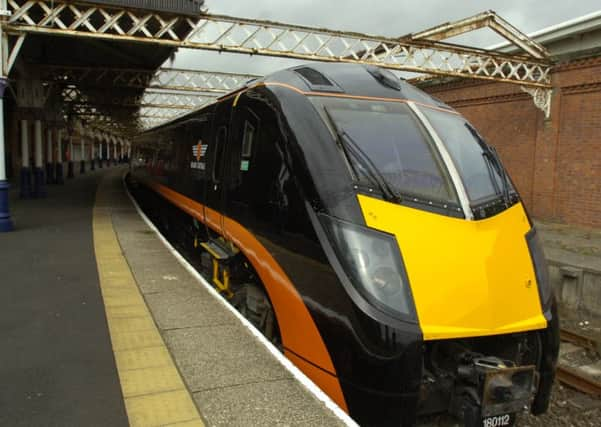Rail franchises should be dropped for more competition, operator says


Richard McClean, managing director at Grand Central Trains, said the contracts for the East Coast and West Coast routes had led to “unstable competitions which create businesses that are unstable in themselves”.
He said: “We’ve got to the stage where the intercity services are too big to sell, like on the West Cost, or too big to operate, as we’ve seen on the East Coast.”
Advertisement
Hide AdAdvertisement
Hide AdThe Government is preparing to name the successful bidder for the East Coast franchise in the coming weeks, after money woes led to two private-sector operators losing the valuable route in two years.
The franchise, which covers services from London to Scotland via York, was taken back under public control in 2009 after billion-pound deals with GNER and National Express collapsed.
Problems with the bidding process on the West Coast main line franchise in 2012 saw the Government overturn its decision to hand the route to FirstGroup over incumbent operator Virgin, incurring £40m costs due to the failed competition.
Speaking to The Yorkshire Post, Mr McClean said allowing commercially-viable services to compete on InterCity routes would boost quality of service and lower ticket prices.
Advertisement
Hide AdAdvertisement
Hide AdHe said: “The intercity services are commercial businesses. Putting them into a contractual structure doesn’t gel well.
“I think there’s a very strong argument that says for services that could operate commercially, you let them do so and don’t over complicate it by trying to let a franchise. It’s hard, it’s expensive and if you make a mistake it all falls apart.”
Grand Central was launched in 2007, before becoming part of Deutsche Bahn’s Arriva Group in 2011. Its annual turnover is £32.7m.
It currently operates five daily return services from London to the North East and four from the capital to West Riding stations, such as Brighouse and Mirfield. It shares some stations, including Northallerton and Doncaster, with East Coast.
Advertisement
Hide AdAdvertisement
Hide AdWhile Grand Central’s growth has been driven through smaller stations, the stops shared by East Coast and Grand Central have seen faster growth than others on the East Coast, Mr McClean said.
“Northallerton has seen the fastest growth of any of the stations on the East Coast,” he said.
“Why would we be surprised? If any other market had two suppliers, one offering a slightly different product to another, you would expect faster growth rather than a monopoly setting the rules of what the customer gets.”
Business theory does not back the idea that an “artificial monopoly” is the best way to get grow or achieve value for money, Mr McClean said.
Advertisement
Hide AdAdvertisement
Hide AdHe said: “Why do we think that’s the best way for rail? What’s missing [from the network] is unlocking the potential of a competitive environment.”
He added: “Imagine a day where there were two intercity operators in Leeds. They’d be working hard to make sure their trains are more attractive than the other guys’ trains.
“That competitive drive would drive service quality and value for money up and there’ll be more people travelling, and that’s what will bring prices down.”
Responding to Mr McClean’s comments, a DfT spokeswoman said the franchising programme has “generated massive benefits for passengers and the economy, including more seats, more trains and better services”.
Advertisement
Hide AdAdvertisement
Hide AdShe said: “The franchises we have let so far this year will return around £6bn to the taxpayer.
“We believe that, through competition, franchising provides the best way to secure rail services and deliver even more benefits for passengers. This approach was endorsed by the independent Brown review published last year.”